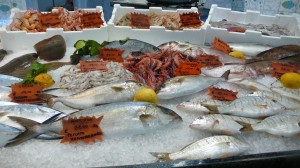
A month ago, I talked to you about my discovery of the benefits of fish for which I have gradually developed a real liking and which have certainly helped me lose weight and keep it off. Christmas was also approaching and I was a bit concerned about a backslide. As it turned out, I needn’t have worried. I was able to enjoy a couple of côtes de boeuf and lamb chops cooked in the open fire, foie gras, Rozan chocolates from the Pyrenees (my favourites), wine at night and other goodies and still lose 1 ½ kilos by mid-January. I could gradually see the centimetres coming off as well.
The clothing situation when you’re losing weight is a bit tricky unless you have an unlimited clothes budget. Fortunately I had kept a few things from the next two sizes down so the first winter wasn’t too much of a problem. As spring came, I was a little short though but determined not to buy too many clothes that I would only wear for a brief period. In seven months, between mid-October and mid-May, I lost 12 kilos and it was beginning to show!

For the first few months, only my family and close friends had really noticed anything, but I can remember going to a get-together at the university in May wearing a new outfit I had splurged on after my last appointment with Doctor Séjean. I suddenly had women swarming around me, telling me how great I looked and asking me how I’d done it. They, too, had been told that after 50, it was pointless even trying to lose weight. That was probably the greatest kick I got out of my diet and was enough to keep me going while I lost the next 8 kilos!
With the warmer weather, I had started cycling again but probably the most effective move was to go back to the swimming pool. I now felt that I could face up to seeing myself in a swimsuit again. I decided to take things slowly and convinced Relationnel into going with me on Saturday or Sunday. Once I was doing 15 x 50 metre laps, I started going a second time during the week by myself. I gradually worked up to 30 laps, which is what I used to do many years ago, but I was much slower than before (age maybe?). In the end, I decided to go back to 20 laps because I was also getting too tired. Doctor Séjean regularly prescribed blood tests and gave me magnesium, vitamin B6 and vitamin D supplements accordingly.
 Very soon after, we went to Italy for a month, moving around quite a lot. Doctor Séjean had told me just to take it easy, eat as much fish and vegetables as possible and pasta too if I wanted because it’s made with durum wheat which is easier to digest than fresh bread. We were mainly staying in B&Bs, with a week in an apartment on the Bay of Naples and the weather was very nice so we tried to only have one meal out a day. The rest of the time we bought picnic food from the markets or local shops, mostly salad vegetables, raw fish and cold meats. We had a glass or two of wine with our meals as well.
Very soon after, we went to Italy for a month, moving around quite a lot. Doctor Séjean had told me just to take it easy, eat as much fish and vegetables as possible and pasta too if I wanted because it’s made with durum wheat which is easier to digest than fresh bread. We were mainly staying in B&Bs, with a week in an apartment on the Bay of Naples and the weather was very nice so we tried to only have one meal out a day. The rest of the time we bought picnic food from the markets or local shops, mostly salad vegetables, raw fish and cold meats. We had a glass or two of wine with our meals as well.
I guess we were getting a lot of exercise from walking but I was surprised when I came home to discover I was the same weight as when I left. In Italy, it’s quite easy to get vegetables in restaurants, particularly grilled zucchinis, eggplant and capsicums. One of the main things I had noticed after a few of months of dieting was that I no longer wanted carbs with each meal so I usually only had them once a day.
By then, any desire to binge or snack had totally disppeared!
If you enjoyed this post, you might like to read
The Natural Skinnies and UsHow I lost 20 kilos after 50, for good – Part I
How I lost 20 kilos after 50, for good – Part 2
How I lost 20 kilos after 50, for good – Part 3
How I lost 20 kilos after 50, for good – Part 4 How I lost 20 kilos after 50, for good – Part 6




Dear Fraussie
Congratulations, it sounds like a great solution. I have a weight problem too and need to do something about it.
But my most pressing problem with another visit to France coming up in the next 6 weeks is my food allergy, developed only in the last 12 years or so. I’m allergic to monosodium glutamate (MSG)/flavour enhancer. Quite a few people say they’re allergic to it but just feel a bit off colour. However, I actually need to be taken to hospital in an ambulance for treatment, although it’s not the usual type of allergy with swelling of mouth/throat etc that can be addressed by an epi-pen. I have a gut allergy that causes (and pardon the details but otherwise it’s meaningless) dreadful vomiting and diorrhea that can only be stopped by injection. MSG also puts my blood pressure up to levels that could result in stroke or heart attack and always alarms doctors who put me on ecg and treatment to bring down blood pressure (my ordinary daily blood pressure is normal – so I don’t take blood pressure medication).
It’s actually happened in Paris a few years ago when we had a lovely lunch at a good restaurant (not a Chinese one). I didn’t mention my msg problem because I thought traditionally the French don’t add msg when cooking. It turned out the cook was Chinese and he had added msg. The restaurant called the pompiers and I was taken to an emergency hospital for treatment. They were very kind and got on to treatment immediately – there was no waiting around as there is likely to be in the emergency department of an Australian hospital.
But even though the allergic reaction is dealt with at the time and I can be released within 12 hours – I’m off colour for several days at least afterwards. Not good when you’re on holidays.
I want to avoid this situation next time. The problem is exacerbated by the fact that some food manufacturers (at least in Australia and UK) add flavour enhancer when making their products, eg some stock cubes/powders, tinned soups, sauces etc contain msg. So even though the restaurant doesn’t add msg themselves, it could be in the food, if they are using one of these pre-prepared products (rather than making their own stock). Not sure about France and french food manufacturers.
It’s not an allergy the French seem to be familiar with – they think I’m saying I’m allergic to gluten which is a totally different chemical that I have no problem with – and I find it’s hard to explain in my limited French. Do you have any suggestions – or any French dialogue you suggest I can use? Would appreciate any advice you can give.
Because it’s never used in sweets/cakes (even by the Chinese or Japanese) sometimes I end up ordering these instead of savoury foods – but of course doing this each day blows diets and is bad for the health anyway. Likewise ordering cheese and bread (in Japan even bread can have msg added before baking).
With best wishes
Pamela
Hi Pamela, that’s certainly a very annoying allergy to have! MSG is called “glutamate monosodique” or GMS in French and it’s true that you don’t often hear of allergies here. Apart from explaining the problem on arrival, it’s difficult to know what to do. More and more restaurants these days don’t do their own cooking, just de-freeze and micro-wave. The larger brasseries usually make everything themselves because they have to keep their staff busy between mealtimes. You could have a paper on which you write “Je suis très allergique au glutamate monosodique. Est-ce que vous en rajoutez chez vous? Parfois on le trouve dans des préparations culinaires qui proviennent de l’extérieur.” I’ll tell you what, I’ll ask Le Mesturet on their FaceBook page and see their reaction.
Many thanks Fraussie. Very helpful. Sorry just one more question, is there an abbreviation or number for msg that is used in french food labels on the packaging? For our three weeks in Paris we’ll be staying in an apartment and will be doing some supermarket food shopping.
Hi Pamela, it seems that the code for MSG in the harmonised system is 29224220 and the number is E E621. I hope that helps. In my search, I came across MSG in olives. Next time I go to the supermarket, I’ll look out for it!
Many thanks Fraussie, that’s very helpful. Your house in Blois is beautiful.
I don’t know if you will see this reply to a very old post but I found this series very interesting. I have lost 23lbs in the past seven months but I am struggling at the moment. After fasting for a day for Ramadan it seems my body thinks it may be deprived and I can’t help eating everything in sight!
I had never heard the thing about, it being impossible to loose weight after 50. Is this a French thing? In the Uk organisations like slimming world and weight watchers are full of mature ladies (and men!) Do you have these in France? These two methods are very popular here and indeed are now recommended by dieticians. The principle of half of your plate vegetables and fruit and one quarter carbs and one quarter protein is how they work and what I have tried to do. It is very interesting what your nutritionists have told you.
Anyway, well done you. Hope you keep in trim. You certainly looked very trim when I met you in July.
Love Denise
Hi Denise, you’ve done well losing 23 lbs in 7 months. Are you struggling to maintain your present weight or to lose more? Sometimes we reach a plateau and have to be a little patient. It’s the 200 grams of protein per meal and no carbs or wine one day a week that helps me the most though I have 2 extra kilos at the moment that have crept on. They have weight watchers here and I’ve used it in the past but I felt I needed something more individual. I think I might see if my nutritionist is back from holidays!
My dietician’s support was partly targeting portion size.
Her other emphases were:
* eat more fish
* swim (as soon as I can)
* fill meals with even more veges that those I already eat.
Typically, for the last 50 years, I’ve eaten five or six types of veges each day in at least two meals per day. I’ve also eaten at least two (and up to five) varieties of fruit most days.
My fish consumption 1970-2014 was maybe a meal per week, often fried as part of Aussie ‘fish n chips’. In latter years, it was a couple of fillets of frozen fish in breadcrumbs.
Last year I aimed for three canned and one (or two) fresh fish meals per week. The dietician applauded this and said keep it up or take it further.
As to swimming, I hope to work up to it by October as we come out of cold mornings. I would prefer it. As she (dietician) says, ‘as your knees are poor, swimming will be an easy less stressful choice.’
I’m keen to let her tell me what to do.
PS She was also thrilled that I have been keeping a food & drink consumption diary since April 1, 2014. In that period, 17 months, I have dropped 21 kilograms without much serious effort. Writing it down (computer log) on a public website [www.myfitnesspal.com] has been good for me and I have had much support.
You have all those great fish in NZ as well (I’m assuming you’re from NZ becuase of the pseudo. Since we have been living in the Loire Valley, we’ve reduced our fish intake because we don’t have the same vendors as we did in Paris. However, we still eat either oysters, scallops or mussels at least once a week and organically-grown smoked salmon or fresh fish another day. This winter, I’m going to buy more fish and freeze it.
Someone else told me about http://www.myfitnesspal.com. Sounds like a great idea.
Maybe you need to find execise you can do during the winter. Not sure what you can do with knees. I walk in the winter and am going to do Nordic walking this winter.